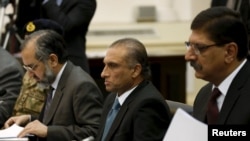Pakistan is hosting a new round of four-party discussions to help advance the Afghanistan government's hope for peace talks with the Taliban.
While all sides hope for progress in Saturday’s meeting in Islamabad, Taliban insurgents have not yet signaled whether they will cease hostilities and join the process.
The so-called Quadrilateral Coordination Group, or QCG, is made up of senior Afghan, Pakistani, American and Chinese diplomats. They are reconvening in Islamabad for their third meeting since the group was launched last month.
The diplomats are trying to prepare a “road map” for a sustainable and productive peace process, and studying what to do about Taliban factions that oppose the talks and refuse to end hostilities.
Afghan President Ashraf Ghani’s attempts to conduct peace talks with the Taliban could not move beyond a preliminary round last July, after it became known the insurgent group’s longtime leader, Mullah Omar, had been dead for two years — a revelation that disrupted political unity within the Taliban.
Despite the lack of progress in recent months, the Afghan Foreign Ministry spokesman, Ahmad Shakeeb Mustaghani, says he expects a road map for peace negotiations with the Taliban will be finalized at the Islamabad meeting.
Critics like Ahmad Rashid, author of several books on Afghanistan, remain skeptical about the chances for progress.
“The public needs to know what is happening," he said. "We have the secret meetings between these four states; we have all sorts of things going on. The public is totally unaware of what is going on. What is this four-nation grouping that is talking about the Taliban?”
The Taliban last week restated its demands for joining the peace process. They include the release of its imprisoned members, removal United Nations travel and financial restrictions on senior insurgent leaders and withdrawal of all foreign troops from Afghanistan.
The skepticism about success of the four-nation talks also stems from the increase in Taliban attacks across Afghanistan and the group's unprecedented territorial gains over the past year, positioning the insurgents to launch an even stronger spring offensive beginning in April.
The outgoing commander of U.S. and NATO forces in Afghanistan, General John Campbell, acknowledged the insurgent gains during testimony Thursday before the Senate Armed Services committee.
“In fact," he added, "as of last week, the units we have on the ground throughout the country report that of the 407 district centers, eight — or 2 percent — are under insurgent control. We assess that another 18 — or just under 4 percent [of district centers] are under what we call insurgent influence.”
General Campbell warned that up to 94 district centers are “at risk” of falling to the Taliban, in his view. He said the Kabul government controls approximately 70 percent of the inhabited parts of Afghanistan.
Diplomatic sources say most of the deliberations the four-nation group has held until now have focused on bridging the "trust deficit" that exists between Pakistan and Afghanistan for a sustainable Afghan peace process.
Intelligence agencies of the two countries blame each other for harboring militant groups and sponsoring cross-border terrorist attacks.
Pakistani opposition lawmaker Shireen Mazari said both sides need to stop covertly supporting the violence if there is to be a lasting settlement of the Afghan conflict. She said militancy on both sides of the border cannot be tackled unless there is cooperation between Pakistan and Afghanistan.
"We have to find the means of isolating those [Taliban] who are not prepared to lay down their arms and dialogue," she said. "Unless there is some intel sharing, some cooperation between the NDS [Afghanistan's intellligence agency] and the Pakistani equivalent, the problem will continue to haunt us.”
Despite months of military and intelligence exchanges between Afghanistan and Pakistan, Mazari said no formal bilateral agreement exists to tackle terrorism and determine who is violating the terms of such a pact.
General Campbell in his testimony this week cited militant sanctuaries on both sides of the border as a major U.S. worry.
“I am concerned about what is going across — both from Pakistan into Afghanistan and, quite frankly, as [Pakistan Army chief] General Raheel [Sharif] has talked to me about — potential stuff going from Afghanistan into Pakistan,” said Campbell.
The American commander told members of the Senate Armed Services Committee that U.S. counterterrorism operations are not effective against or aimed at the Taliban:
“What I would tell you is that our country has made the decision that we are not at war with the Taliban,” he said.
Officials with knowledge of the discussions the four-nation group has held so far say that all sides are pushing President Ghani to come up with political and other incentives to encourage the Taliban to come to the table for talks.
Ghani said recently that he views the insurgency as a political opposition movement. General Campbell's comments about the Taliban are seen by observers in Islamabad and Kabul as concessions to encourage the insurgent group to join the peace process.




